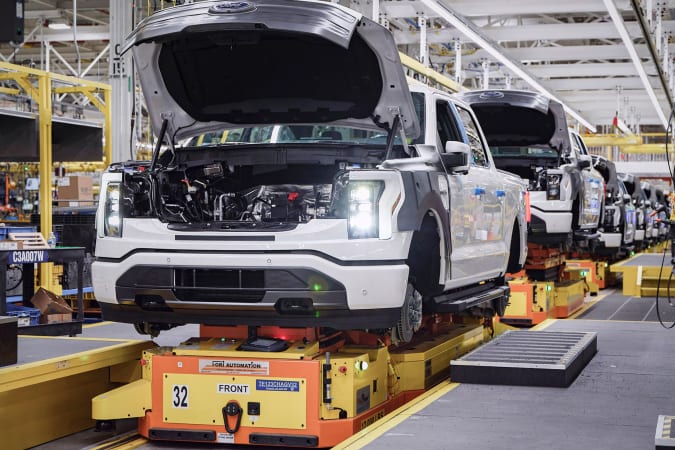The electric pickup truck market is now truly competitive. Ford has started “full” production of the F-150 Lightning at its Rouge Electric Vehicle Center in Dearborn, Michigan, roughly four months after it stopped taking reservations. The company will start shipping the base Pro model in the “coming days,” Ford said at an event (below). It’s not certain how many Lightnings will reach customers this year, but Ford expected output to scale to 150,000 trucks per year in 2023.
The automaker capped reservations at 200,000 and has stopped taking orders for the 2022 model year. About three quarters of these potential adopters don’t currently drive Ford vehicles, the company said. The firm added that “many” are first-time EV or truck buyers, but didn’t provide figures.
The electric F-150 promises usual EV benefits like acceleration (0-60MPH in 4.5 seconds with an extended battery) and strong, near-instant torque (775lb/ft) with up to a 320-mile range. However, it also has a few uncommon perks. The front trunk is unusually cavernous at over 14 cubic feet, and owners can power their homes, work tools and (eventually) the electrical grid.

Ford
The main allure, however, remains the price. While the $39,947 base Pro model won’t satisfy some (you’ll have to pay $72,474 to get an XLT with the extended battery), that makes it the most affordable electric pickup available and within reach of many conventional F-150 buyers. Rivian’s R1T starts at $67,500. Tesla originally quoted a $39,900 entry point for the Cybertruck, but it stopped listing prices. Chevy doesn’t deliver its $39,900 starter Silverado EV until 2024.
This isn’t the first electric pickup in the US. Rivian began production in September. As Ford is keen to point out, though, the F-150 is still the best-selling passenger vehicle in the US. While the Lightning is unlikely to outsell its conventional sibling in the near future, its familiar name could draw in EV newcomers who were wary of smaller brands, or even the Mustang Mach-E. At the least, it puts pressure on Chevy, Rivian and others hoping to challenge Ford’s cargo hauler.
All products recommended by Engadget are selected by our editorial team, independent of our parent company. Some of our stories include affiliate links. If you buy something through one of these links, we may earn an affiliate commission.
